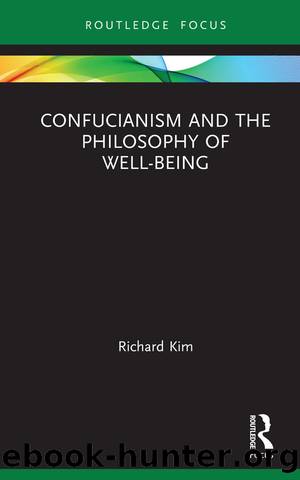Confucianism and the Philosophy of Well-Being by Kim Richard;

Author:Kim, Richard;
Language: eng
Format: epub
Publisher: Taylor & Francis Group
Published: 2020-08-15T00:00:00+00:00
The significance placed on filial piety in Confucianism is closely tied to the roles, families, and gratitude developed and sustained within the Confucian form of life. A culture that prizes filial piety is one that takes seriously the value of oneâs parents, especially in a challenging and vulnerable period, by building on the proper gratitude one ought to have toward them. One instrumental role served is the satisfaction that parents who are looking after young children can have in realizing the reciprocal nature of the child-parent relationship. In a culture that prizes taking care of oneâs elderly parents in old age, parents will have some assurance that they will not be neglected by their children in the future. Now, perhaps this may sound too instrumental; after all, we should love our children unconditionally, and a good parent does not care for their children because of future perceived benefits. But on the other hand, it does seem that a culture in which oneâs elderly parents are simply discarded like an old rag or given insufficient attention and care may undermine our confidence in the broader value of families and perhaps human relationships. And certainly for those elderly parents, their well-being seems closely tied to the extent that their children visit them or seem to be genuine appreciative of them.
Perhaps more importantly, the care that parents hope to receive from their children in old age isnât centrally about material goods but about genuine affection, gratitude, and psychological connection. A recent study of relationships between aging parents and their adult children in the United States suggests that elderly parents want a balance between autonomy and connection. They do not seek to be smothered by their adult children but do appreciate the fact that their adult children are there for them and willing to come to their assistance if needed. In the study, many decried the over-protectiveness of their adult children (Spitze and Gallant). Such studies also reveal the complexity of relationships between aging parents and their children, which likely vary in some ways across cultures and are shaped by cultural norms and expectations.15 Nevertheless, I think the fact that parents hope for appreciation and a genuine connection to their children (at least in healthy relationships) seems to be shared across culture and time.
Download
This site does not store any files on its server. We only index and link to content provided by other sites. Please contact the content providers to delete copyright contents if any and email us, we'll remove relevant links or contents immediately.
The Lost Art of Listening by Michael P. Nichols(7165)
Why I Am Not A Calvinist by Dr. Peter S. Ruckman(4047)
The Rosicrucians by Christopher McIntosh(3373)
Wicca: a guide for the solitary practitioner by Scott Cunningham(3044)
Signature in the Cell: DNA and the Evidence for Intelligent Design by Stephen C. Meyer(2879)
Real Sex by Lauren F. Winner(2867)
The Holy Spirit by Billy Graham(2777)
To Light a Sacred Flame by Silver RavenWolf(2678)
The End of Faith by Sam Harris(2636)
The Gnostic Gospels by Pagels Elaine(2399)
Waking Up by Sam Harris(2331)
Nine Parts of Desire by Geraldine Brooks(2281)
Jesus by Paul Johnson(2229)
Devil, The by Almond Philip C(2205)
The God delusion by Richard Dawkins(2190)
Heavens on Earth by Michael Shermer(2189)
Kundalini by Gopi Krishna(2093)
Chosen by God by R. C. Sproul(2055)
The Nature of Consciousness by Rupert Spira(1982)
